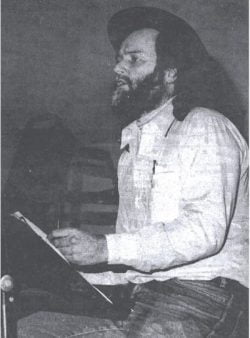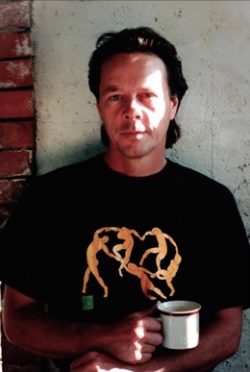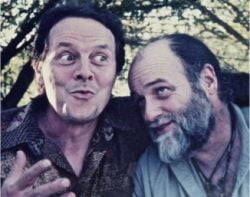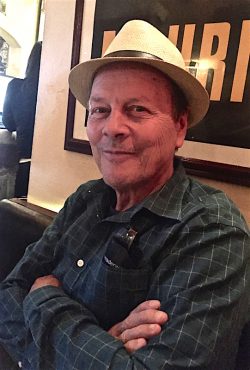#778 On the road with Sir Kenneth
MEMOIR: On the road with Sir Kenneth
by Grahame Ware
*

Recently we published Grahame Ware’s review of Horn Swoggled: A Play by Armstrong playwright Ken Smedley: see The Ormsby Review no. 762 (March 5, 2020). In a follow-up email, Grahame described his intense and productive artistic friendship with Smedley in the mid-1990s, when the two men toured the Okanagan performing works by or about the playwright George Ryga (1932-1987).
Sensing an important story, I encouraged Grahame to turn his off-the-cuff email into a longer memoir for the enjoyment of the readers of The Ormsby Review. The result follows. –Ed.
*

Actor-playwright Ken Smedley and I did a six-city tour with the George Ryga play, Ploughmen of the Glacier (Talonbooks, 1977) as a stage reading in 1994. It was a two-hander, as they say in the business. We spent a considerable amount of time adapting the play for two voices. (We put the play’s third and minor character into a “remedial” narrative.)
A great part of the rehearsing was spent at La Casita, the small house next to what had been Ryga’s main house in Summerland, where Ken was manager and where Ryga and his family had lived from 1962 until his death in 1987, aged 55. Ryga’s family had allowed his house to be used for some time as the George Ryga Centre, an arts and culture hub for the Okanagan. This meant travelling down from Armstrong, where I lived, for the space, peace, and quiet necessary to do the work.
We rehearsed the play for about three days and made changes to make it work better. Then we took it on the road. Ken took care of all the posters and newspaper and radio spots for the tour. It meant a lot of time and work for us, and we did it for free. In the end, we raised just under $2,000 — enough to put towards property taxes for the Ryga house that year.

We staged a very memorable performance of Ploughmen of the Glacier at a theatre in Penticton that Ryga’s wife, Norma, attended. She loved it and thought it had new life. I remember her saying, “I could hear George’s voice and spirit so near, so close.”
In Ploughmen of the Glacier, I played the tough prospector and mining promoter, Volcanic Brown, and Ken played the acerbic publisher and journalist Robert Lowery. In the process, Ken and I got to know each other pretty well. He told me about himself, his family and his past, and I shared where I was in my life. As an actor, you go somewhere emotionally and spiritually in good plays because you get both outside and inside yourself. In the aftermath of the performances, the dénoument and debriefing, there was no idle talk between us — just emotions that went to the core of what we had shared. As we got to know each other better, we gave each other new handles: he called me Buzzerini and I called him Sir Kenneth.
For my part, the role of Volcanic Brown unleashed in me the ability to do a slow, simmering rage and play a raw, physical individual, to really hit all the notes in the manner of Miles Davis. This was offset by a cool philosophical penchant for soliloquy delivered, I hoped, with a wistful and transcendent irony. I tried to let my words and ideas hang out in front of me and worm their way into the minds of the audience, and let them breathe the words into their lungs.

Ken was an amazing director and showed me so many things and gave me not just encouragement but critical perspective. He contributed much to the new confidence in my voice.
The tour’s success let Ken and me do something even better in the fall of 1996, a performance based on The Athabasca Ryga (Talonbooks, 1990). This was a series of Ryga’s memoirs and stories that we blended and adapted into a performance. On my guitar I composed music that became an integral element in the play. I sang, as did Ken, and we did some duos between the scenes to weave a story and get at the heart and pathos of Ryga’s early life in northern Alberta, at the very northerly edge of where one can rightly farm in Canada. The music was bluesy, melancholy, and at times joltingly angry. I really let it fly on my guitar and Ken’s gravitas was on full display. Before a very appreciative crowd of 150 people at the Centennial Auditorium in Armstrong, saxophonist Doug Sonju recorded the final performance of the tour.
As it turned out, that was the last time Ken and I did theatre together. We had worked closely for five years and, in addition to many other plays, we had done two original two-hander adaptations of Ryga.

It proved to be a tremendous experience for me — but it also pushed me further from my marriage. It didn’t seem like it at the time, but the change was necessary for me to grow and for Anne, my wife, to be free of me as well. Our relationship was bigger than either of us. As tough as it was — it had been such a sweet marriage with lovely children and so many good times – it was time to move on after 25 years. There didn’t seem to be any way I could change things. I was just as frustrated as Anne. When she finally left me, my grief was overwhelming.
Working with Kenny and steeping myself in the work of George Ryga was the catalyst for a new life. Eventually, it also gave me, at the age of 48, another chance in another partnership. This was just what I needed. The work and the tours with Ken helped me release the pain, process the skenk of failure and rejection, and get in touch with stuff I’d kept behind closed doors for too long. They’d been knocked in at this point. I embraced the crisis and found myself in a space both exciting and scary.

In later years, Ken and I took to gifting each other cosmic doggerel on our birthdays. On my 50th, Ken’s poem to me included the observation that my transitional girlfriend had mesmerized me. I was, he wrote, “a stag frozen in her considerable headlamps,” to which I replied, “Guilty as charged, your honour!”
I wrote the poem below for Ken’s 53rd in 2004. It reflects on the close bond we developed as we worked on Ploughmen of the Glacier and Athabasca Ryga ten years earlier. It concerns his parents’ relationship, his birth, his identity, and the character he revealed and that I surmised from our intensely creative time together as we promoted and interpreted the life and work of George Ryga.
The Fall of ’51

Hurtling back to the Fall of ‘51 when after cocktails
the journalist and the nurse locked in a luminous embrace,
a space or trap of love and guilt,
their love not strong enough to spring the door open
to celebrate themselves outside
of that shared and furtive space,
not big enough for themselves
let alone you.
You’ve wondered many times, dwelt upon it really,
the fact of their leave-taking,
the love/not love
the there/not there,
but how could you know the why?

Your soul wondered then and wonders still
about your makeup and passion and the love you feel
grasping in the air, so keen to make cooing sounds that reverberate
unable to share it with the source
with the love that lit up the night
in the late Fall of ’51.
An incandescent love filled the room with what was to be you:
a tiny wishbone like an exotic fruit seed
grew at the crux of those halves
planted in the garden of their desire,
but later in a lonely harvest
only you were there.
It takes two hands and a little luck
to make that wishbone wish come true
but your hands were too small,
their guilt too great,
their time had come to an end.
The responsibility of your Being winnowed out
like chaff too large for their screen
and on a hot Vancouver day you were born,
not forgotten, not unloved, but adoptable.

It’s taken years to get big and strong enough
to go back and seize that wishbone
seize it for yourself
seize it for them
hold that child in your own hands
caress and grip the crux of the wishbone
and finally see those halves
wishing you a birthday wish.
It’s a wish you’ve always wanted to make.
Your wailing voice is larger now
not notes but chords cascading against the wall
between you and them,
sound composted and trickling down that wall
seeds now sprouting in the cracks,
forget-me-nots and lilies too,
blue and white
to white and blue.
 But up you go against that wall
But up you go against that wall
your back is warm
your arms are long
your love and family close at hand,
your Beloved Leo sings along
despite the rage in your painful song.
You hold your children close
and your wish for peace after
years of raving against the world provides
fuel and bellows for your plays and books.

And falling from the top of that wall
you scaled so cleverly and all,
once again you lie there now
with your birthday blues
left again at the foot of the wall
and the old ’63 Skidoo upon you now.
There’s nothing left, nothing at all,
just you, a heartbeat, a laugh,
astonishment, disbelief and all good stuff.
So go ahead this day and say goodbye
disidentify with the abandonment.
Say hello to mum and dad.
They’re gone, I’m sure, but think of you still
up there in the ether as they swirl
stripped of their bodies, just spirits now
yearning for you again and for themselves
when, after cocktails, trembling,
they didn’t think, they just loved.
Their psychic fingers now entwined round one side
of the big wishbone that is you
finally trying to pull you free.
So wrap your pinkie round the bone
make a wish and think of them.
Give it a gentle tug, wait to see
if you got the fat side,
got your wish,
got to giggle in the candlelight of
birthday cake and love.
Just the birthday boy and mum & dad
the nurse & the journalist
smiling…
floating…
forever.
*
Ken Smedley and George Ryga have always been close by me. Ken was the best man I ever met, and Ryga was the best man I never met.
*


Grahame Ware is a writer, book reviewer, and carver on Gabriola Island. He studied creative writing and communication studies at Simon Fraser University. As a feature writer, often under the Buzz Ware handle, he has been published in Georgia Straight, Vancouver Magazine, TV Week, TV Guide, and Toronto Star, and he had shows on CBC radio, CKVU-TV, and CO-OP radio as a freelance broadcaster and producer. He worked with Ken Smedley in performing plays by George Ryga, Sam Shepard, and George F. Walker in the Okanagan. He taught ornamental horticulture at Okanagan College, made a living as a landscape contractor and rare plant nurseryman, and spent three years as editor of the Alpine Garden Club of B.C. With Dan Heims, he is author of Heucheras and Heucherellas: Coral Bells and Foamy Bells (Timber Press, 2005), and contributed articles to the International Rock Gardener, The Rock Garden, and The Plantsman. See www.phantasma.ca for his wood sculpture and related subjects.
*
The Ormsby Review. More Books. More Reviews. More Often.
Publisher and Editor: Richard Mackie
The Ormsby Review is a journal service for in-depth coverage of B.C. books and authors. The Advisory Board consists of Jean Barman, Robin Fisher, Cole Harris, Wade Davis, Hugh Johnston, Patricia Roy, David Stouck, and Graeme Wynn. Scholarly Patron: SFU Graduate Liberal Studies. Honorary Patron: Yosef Wosk. Provincial Government Patron since September 2018: Creative BC
“Only connect.” – E.M. Forster
2 comments on “#778 On the road with Sir Kenneth”